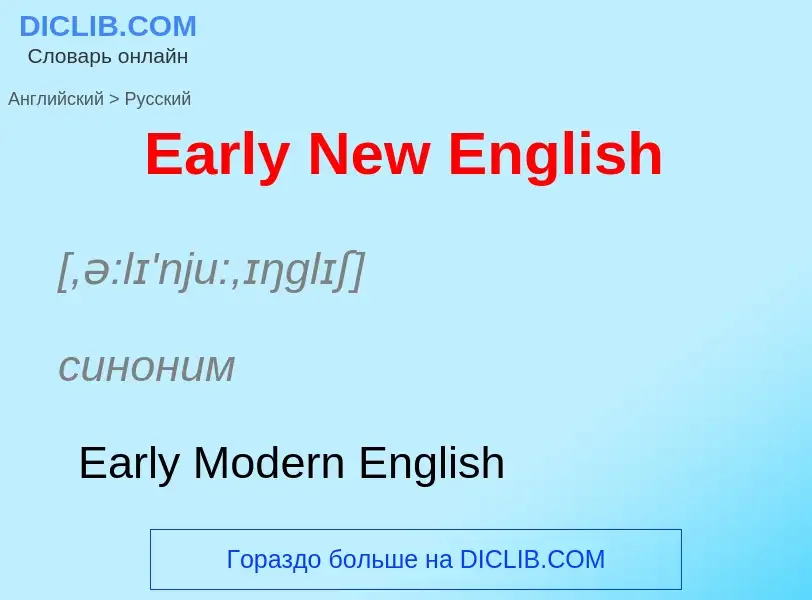Übersetzung und Analyse von Wörtern durch künstliche Intelligenz ChatGPT
Auf dieser Seite erhalten Sie eine detaillierte Analyse eines Wortes oder einer Phrase mithilfe der besten heute verfügbaren Technologie der künstlichen Intelligenz:
- wie das Wort verwendet wird
- Häufigkeit der Nutzung
- es wird häufiger in mündlicher oder schriftlicher Rede verwendet
- Wortübersetzungsoptionen
- Anwendungsbeispiele (mehrere Phrasen mit Übersetzung)
- Etymologie
Early New English - Übersetzung nach Englisch
[,ə:lɪ'nju:,ɪŋglɪʃ]
синоним
[,ə:lɪ'mɔdtn,ɪŋglɪʃ]
общая лексика
ранненовоанглийский (язык) (с конца 15 по 17 вв.)
[,mɔdtn'ɪŋglɪʃ]
общая лексика
новоанглийский язык (с конца 15 в.)
современный английский язык (с середины 19 в.)
синоним
Definition
Wikipedia
Early Modern English (sometimes abbreviated EModE, or EMnE) or Early New English (ENE) is the stage of the English language from the beginning of the Tudor period to the English Interregnum and Restoration, or from the transition from Middle English, in the late 15th century, to the transition to Modern English, in the mid-to-late 17th century.
Before and after the accession of James I to the English throne in 1603, the emerging English standard began to influence the spoken and written Middle Scots of Scotland.
The grammatical and orthographical conventions of literary English in the late 16th century and the 17th century are still very influential on modern Standard English. Most modern readers of English can understand texts written in the late phase of Early Modern English, such as the King James Bible and the works of William Shakespeare, and they have greatly influenced Modern English.
Texts from the earlier phase of Early Modern English, such as the late-15th-century Le Morte d'Arthur (1485) and the mid-16th-century Gorboduc (1561), may present more difficulties but are still closer to Modern English grammar, lexicon and phonology than are 14th-century Middle English texts, such as the works of Geoffrey Chaucer.

![Gorboduc]]'' (printed 1565). ''The Tragedie of Gorbodvc, whereof three Actes were wrytten by Thomas Nortone, and the two laste by Thomas Sackuyle. Sett forthe as the same was shewed before the Qvenes most excellent Maiestie, in her highnes Court of Whitehall, the .xviii. day of January, Anno Domini .1561. By the Gentlemen of Thynner Temple in London.'' Gorboduc]]'' (printed 1565). ''The Tragedie of Gorbodvc, whereof three Actes were wrytten by Thomas Nortone, and the two laste by Thomas Sackuyle. Sett forthe as the same was shewed before the Qvenes most excellent Maiestie, in her highnes Court of Whitehall, the .xviii. day of January, Anno Domini .1561. By the Gentlemen of Thynner Temple in London.''](https://commons.wikimedia.org/wiki/Special:FilePath/Gorboduc TP 1565.jpg?width=200)
![[[Shakespeare]]'s writings are universally associated with Early Modern English. [[Shakespeare]]'s writings are universally associated with Early Modern English.](https://commons.wikimedia.org/wiki/Special:FilePath/Shakespeare.jpg?width=200)
